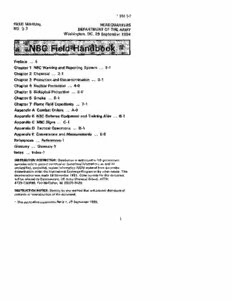
NBC Field Handbook [US Army FM 3-7] PDF
Preview NBC Field Handbook [US Army FM 3-7]
* FM 3-7 i FM 3-7 PREFACE This manual, FM 3-7, is designed as a guide to help the chemical soldier at battalion level and below in NBC defense. It details the NBC warning and reporting system, and how to locate, identify, and operate in and around NBC contamination. This manual is designed to bean easy-to-read, step-by-step manual depicting the manual method of calculating NBC defense procedures useful for the field soldier. A more detailed discussion of NBC defensive measures may be found in: FM 3-3, Chemical and Biological Contamination Avoidance FM 3-3-1, Nuclear Contamination Avoidance FM 3-4, NBC Protection FM 3-4-1, Fixed Site Protection FM 3-5, NBC Decontamination FM 3-11, Flame Field Expedients Chemical soldiers must be familiar with and be able to apply the information in this manual. Although this manual does not implement any particular international agreement, material presented herein complies with related international agreements. A list of related international agreements and other references can be found in the references section. Unless otherwise stated, whenever the masculine gender is used, both men and women are included. The proponent for this manual is HQ, TRADOC. Submit changes for improving this publication on DA Form 2028 (Recommended Changes to Publications and Blank Forms) and forward it to: Commandant U.S. Army Chemical School ATTN: ATZN-CM-FNB Fort McClellan, AL 36205-5020. ii FM 3-7 CHAPTER 1 NBC Warning and Reporting System The NBCWRS consists of standard NBC Reports and Strike Warnings. This system is broken down into the following areas: - NBC threat status NBC warning and reporting system (NBCWRS) Friendly strike warnings NBC weather and wind messages NBC Threat Status (STANAG 2984) a. Serial O (none). The opposing force does not possess any NBC defense equipment, is not trained in NBC defense or employment, and does not possess the capability to employ NBC warfare agents or systems. b. Serial 1 (low). The opposing force has an offensive NBC capability, has received training in defense and employment techniques, but there is no indication of the use of NBC weapons in the immediate future. c. Serial 2 (medium). The opposing force is equipped and trained in NBC defense and employment techniques. NBC weapons and employment systems are readily available. NBC weapons may have been employed in other areas of the theater. Employment of NBC weapons is considered probable. Indicators would be: NBC munitions deployed to field storage sites. Enemy troops wearing or carrying protective equipment. NBC reccon elements observed with conventional recon units. NBC decon elements moved forward. d. Serial 3 (high). The opposing force possesses NBC warfare agents and delivery systems. NBC defense equipment is available and training status is considered at par or better than that of the United States. NBC weapons have already been employed in the theater and attack is considered probable in the immediate future. Indicators are: NBC attack in progress but not in area of operation. NBC warnings/signals to enemy troops. 1-1 FM 3-7 NBC munitions delivered to firing units within range of friendly forces. Movement of surface-to-surface missiles to a launch site. The threat status can be used for any size or type unit. It is possible to have a CB (chemical-biological) status of three and a nuclear status of zero. Vulnerability Analysis To assist field commanders in developing the NBC threat status, refer to tables 1-1, 1-2, and 1-3. For more detailed discussion of chemical agents, see FM 3-3, Chapter 1 or FM 3-4, Chapter 3. 1-2 FM 3-7 1-3 FM 3-7 1-4 FM 3-7 1-5 FM 3-7 1-6 FM 3-7 1-7 FM 3-7 Flow of NBC Reports NBC reports 1 through 6 move between units and higher headquarters as shown in Figure 1-4. 1-8
